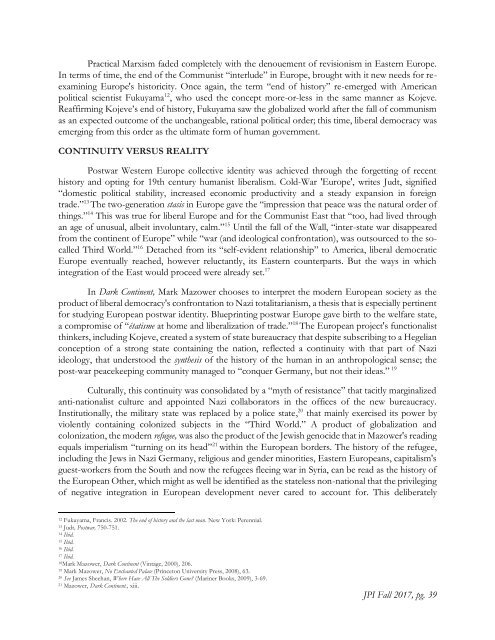Fall 2017 JPI
Create successful ePaper yourself
Turn your PDF publications into a flip-book with our unique Google optimized e-Paper software.
Practical Marxism faded completely with the denouement of revisionism in Eastern Europe.<br />
In terms of time, the end of the Communist “interlude” in Europe, brought with it new needs for reexamining<br />
Europe's historicity. Once again, the term “end of history” re-emerged with American<br />
political scientist Fukuyama 12 , who used the concept more-or-less in the same manner as Kojeve.<br />
Reaffirming Kojeve’s end of history, Fukuyama saw the globalized world after the fall of communism<br />
as an expected outcome of the unchangeable, rational political order; this time, liberal democracy was<br />
emerging from this order as the ultimate form of human government.<br />
CONTINUITY VERSUS REALITY<br />
Postwar Western Europe collective identity was achieved through the forgetting of recent<br />
history and opting for 19th century humanist liberalism. Cold-War 'Europe', writes Judt, signified<br />
“domestic political stability, increased economic productivity and a steady expansion in foreign<br />
trade.” 13 The two-generation stasis in Europe gave the “impression that peace was the natural order of<br />
things.” 14 This was true for liberal Europe and for the Communist East that “too, had lived through<br />
an age of unusual, albeit involuntary, calm.” 15 Until the fall of the Wall, “inter-state war disappeared<br />
from the continent of Europe” while “war (and ideological confrontation), was outsourced to the socalled<br />
Third World.” 16 Detached from its “self-evident relationship” to America, liberal democratic<br />
Europe eventually reached, however reluctantly, its Eastern counterparts. But the ways in which<br />
integration of the East would proceed were already set. 17<br />
In Dark Continent, Mark Mazower chooses to interpret the modern European society as the<br />
product of liberal democracy's confrontation to Nazi totalitarianism, a thesis that is especially pertinent<br />
for studying European postwar identity. Blueprinting postwar Europe gave birth to the welfare state,<br />
a compromise of “étatisme at home and liberalization of trade.” 18 The European project's functionalist<br />
thinkers, including Kojeve, created a system of state bureaucracy that despite subscribing to a Hegelian<br />
conception of a strong state containing the nation, reflected a continuity with that part of Nazi<br />
ideology, that understood the synthesis of the history of the human in an anthropological sense; the<br />
post-war peacekeeping community managed to “conquer Germany, but not their ideas.” 19<br />
Culturally, this continuity was consolidated by a “myth of resistance” that tacitly marginalized<br />
anti-nationalist culture and appointed Nazi collaborators in the offices of the new bureaucracy.<br />
Institutionally, the military state was replaced by a police state, 20 that mainly exercised its power by<br />
violently containing colonized subjects in the “Third World.” A product of globalization and<br />
colonization, the modern refugee, was also the product of the Jewish genocide that in Mazower's reading<br />
equals imperialism “turning on its head” 21 within the European borders. The history of the refugee,<br />
including the Jews in Nazi Germany, religious and gender minorities, Eastern Europeans, capitalism's<br />
guest-workers from the South and now the refugees fleeing war in Syria, can be read as the history of<br />
the European Other, which might as well be identified as the stateless non-national that the privileging<br />
of negative integration in European development never cared to account for. This deliberately<br />
12 Fukuyama, Francis. 2002. The end of history and the last man. New York: Perennial.<br />
13 Judt, Postwar, 750-751.<br />
14 Ibid.<br />
15 Ibid.<br />
16 Ibid.<br />
17 Ibid.<br />
18Mark Mazower, Dark Continent (Vintage, 2000), 206.<br />
19 Mark Mazower, No Enchanted Palace (Princeton University Press, 2008), 63.<br />
20 See James Sheehan, Where Have All The Soldiers Gone? (Mariner Books, 2009), 3-69.<br />
21 Mazower, Dark Continent., xiii.<br />
<strong>JPI</strong> <strong>Fall</strong> <strong>2017</strong>, pg. 39
















